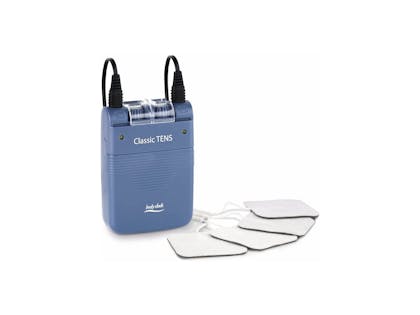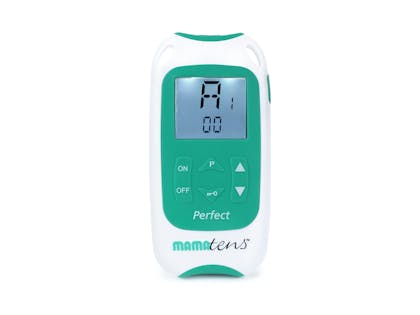buying guides
How to buy the best TENS machine for your labour

This page contains affiliate links, which means we may earn a small amount of money if a reader clicks through and makes a purchase. All our articles and reviews are written independently by the Netmums editorial team.
There’s no end of information out there for women preparing to give birth, but what we all want to know is, what can we do to make it easier?
Well, a TENS (transcutaneous electrical nerve stimulation) machine is a useful little labour aid that can help to make the pain far more bearable.
TENS machines are battery-operated units that attach via sticky electrode pads onto your lower back.
The machine sends little electrical signals through these pads to disturb the pain messages being sent to your brain, which can help to dull it.
TENS machines are often recommended by midwives for the early stages of labour, particularly before you go into hospital, and for women who are hoping for a natural birth.
Using a TENS machine won’t have any effect on your unborn baby.

1. Classic TENS Machine
* Traditional-style analogue TENS machine
*Easy to use with three mode settings
*Adjustable intensity controls
This manual tens machine is similar style to those used by the NHS and has controls that are easy to adjust, so users can be as comfortable and in control as possible. Treatment time can be preset with the timer control, for 30 or 60 minutes or to work continuously.

2. TensCare - Perfect mamaTENS
*Helps to ease the pain of contractions
*Up to 10 hours of continuous use per full charge
*20 levels of intensity allows you to fine-tune the pulse
This digital tens machine has 16 pre-programmed massage modes and 20 levels of intensity to help you manage your pain more effectively. It can be used for up to 10 hours of continuous use once fully charged with the USB cable.
How much does a tens machine cost?
It’s possible to buy one for under £10, but as with most things, you get what you pay for – expect cheaper models to feel flimsy, have fewer functions, and perform less reliably than more expensive machines.
Increase your budget to around £30, and you’ll be looking at slim-line TENS machines that are more robust, easy to use, and have a selection of modes and settings.
At the top end of the scale, around the £120 mark, TENS machines have features such as a wider range of intensity levels and digital rather than manual operation.
Should you buy a manual or a digital tens machine?
The first thing to consider when you’re buying a TENS machine is whether you’d rather have a manual or digital model.
With a manual machine, you adjust the intensity and frequency of the pain-relieving pulses by turning knobs or dials, whereas the digital versions have buttons to press.
Think about how easy the machine will be to use – especially when you’re in pain, or relying on your other half to do it – and also about whether you’re liable to accidentally change the output levels, which could give you a rather surprising burst of electricity!
Some digital TENS machines come with pre-set modes that allow you to select the best type of pain relief for your particular issue.
This can be helpful if you’re not sure where to start, but do check that there is a specific programme for labour pain, as most TENS machines are also marketed for general joint and nerve pain relief.
Other features to bear in mind include the size of the display screen, how easy it is to change the batteries (an important detail if it runs out of power mid-labour), whether you can also operate it off the mains, and whether it comes with a storage case: a handy extra if you’re going to be packing it in your labour bag.
A belt clip is also useful if you’re hoping to stay mobile in labour.
You can hire a tens machine
Although this will still cost you around £30, the unit will be of a higher quality than the ones you could buy for a similar price.
Although TENS machines can be reused as many times as you like, the sticky pads that attach the electrodes to your back do need to be replaced after a few uses.
Some packages come with spare pads, but if yours doesn’t, it’s sensible to buy some extra ones in case you have a long labour or several false alarms.
It’s also worth knowing that TENS machines can’t always be used throughout labour: you won’t be able to keep it on if you use a birth pool, have a bath or shower, or, in some cases, after your waters have broken, because of the risk of getting a shock.
 '
'
Checklist
• TENS machines help to relieve labour pain by confusing the pain messages sent from the nerves in your back to the brain.
• They’re natural, drug-free and don’t affect your baby.
• You can choose from manual or digital models.
Read on:
- Your complete pregnancy skin and haircare kit
- The six things you didn't know you needed for labour
- The best buys for your labour bag



